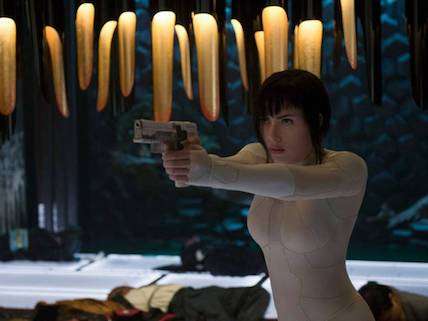Movie Review: Ghost in the Shell
Scarlett Johansson in a mixed-bag reenactment of an anime classic.

The new Ghost in the Shell channels its visual elements from familiar futuristic sources. The neck jacks, the holograms, the wire-fu leaps and endless dystopian rain are part of a sci-fi tradition that descends from Blade Runner and Neuromancer down through the 1989 Ghost in the Shell manga, the 1995 Ghost in the Shell anime film, and of course the 1999 cyberpunk landmark, The Matrix. But the new movie does have its own mood—it's a little bit reflective, although not enough to clog the action—and its own look (scruffy CGI) and sound (warm-bath drones and unstable synth garglings). It's an interesting film to watch. It's just hard to care about a single thing that's going on in it.
Fans of the earlier Ghost in the Shell animated film will find many references to check off here: the big garbage-truck chase, the splashy invisible-man smackdown, brief echoes of Balkan-style choral keening. The story has been only minimally adjusted, and the characters remain largely undefiled. Scarlett Johansson, in black leather action gear and black punk-chop hair, plays Major, a cyborg team leader with the government's Section 9 antiterrorism department. She operates in a gaudy postwar world in which just about everybody has artificial body enhancements. In her case, only her mind—her "ghost"—is human; her body, or "shell," is a computerized construct. (This offers a handy dodge for the charge that Johansson's casting constitutes "whitewashing" of a character that was originally Japanese—who can tell if it's only a shell? Later, we are further informed that Major's hardy brain was all that survived after a maritime disaster that killed her immigrant parents while they were bringing her to Japan—they could've been coming from, like, anywhere, right? Sure.)
Overseen by Section 9 chief Aramaki (uber-cool Japanese actor-writer-director "Beat" Takeshi Kitano), Major and her platinum-haired partner Batou (Pilou Asbæk, also a costar in Johansson's 2014 action hit Lucy) are currently battling an infestation of criminal brain-hackers, and are hot on the trail of the group's evil leader. There's quite a bit of story here; but although I was sort of sure what was happening while it was happening, and have since done remedial research to remind me what was happening, I still couldn't actually tell you what was happening if you threatened me with a hammer. We get to spend quality time with the sweet robotics scientist Dr. Ouelet (Juliette Binoche), who created Major in her current form and thus harbors maternal feelings for her, and we get to recoil from Ouelet's skuzzy boss, Cutter (Peter Ferdinando), who sees Major as nothing more than a weapon. There are also key innings with a dramatically cloaked and metal-bodied character named Kuze, played by Michael Pitt (now going by his full name, Michael Carmen Pitt, no idea why).
Fortunately, director Rupert Sanders (Snow White and the Huntsman) gives us a lot to look at while we're failing to keep track of whatever it is that's going on. There's a spectacular scene in which a corporate confab in a spiffy restaurant is disrupted by a corps of murderous robo-geishas, and some trademark ScarJo butt-kicking when Major is assaulted by a pair of leering thugs (who quickly discover there's really nothing to smirk about). The production design—both digital and otherwise—is always arresting: giant hologram fish swim through the city streets, bundles of cables and bags full of bodies dangle in the air, and water drips without letup in the enveloping murk.
The movie has two problems. One is that the fundamental Ghost in the Shell theme of technological alienation, which played out perfectly in the measured pace of the animated film, can't be given enough space to do so in a big-budget live-action movie—time is money, and gentle melancholy doesn't pay its way. And while Major's deep unhappiness with her cold cyborg nature is examined at some length, Johansson gives such a deadpan performance that very little poignance shines through. There may be no actor who looks better back-flipping off the top of a skyscraper in a skintight body suit, but here, it pains me to report, that's not enough.


Show Comments (36)